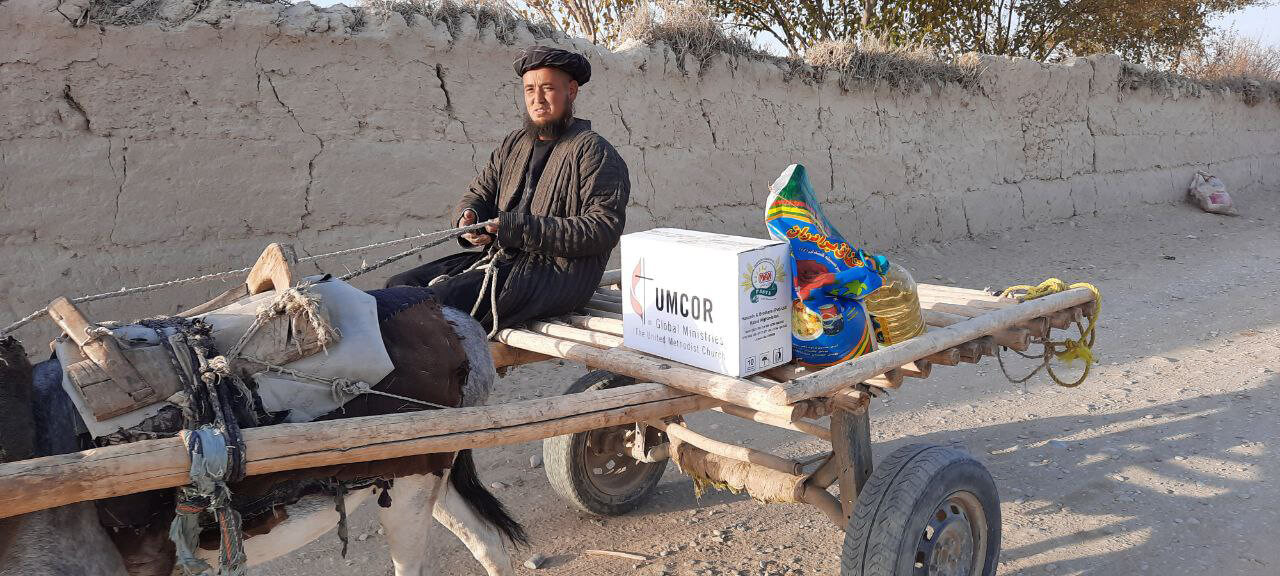Meeting the needs of people displaced in Afghanistan

A recipient of an UMCOR food box returns home with food for his family. PHOTO: IBC
UMCOR partners with International Blue Crescent to provide humanitarian relief to displaced people living for eight months or more in informal camps, turned back from the Tajikistan border by the Taliban.
By Christie R. House
March 16, 2022 | ATLANTA
The United Nations High Commissioner for Refugees (UNHCR) estimates Afghanistan’s internally displaced population at about 700,000, with numbers rising throughout 2021, leading up to and after the U.S. withdrawal from the country. Many tried to flee across the borders of Pakistan, Iran and Tajikistan before the Taliban took over, but some did not make it out. The Afghan town of Mazar-i-Sharif, close to Tajikistan, now exceeds a population of 20,000 displaced Afghans, who have no way to move forward but who fear the consequences of returning home.
Displaced families, many made up of women, children and the elderly, live in informal make-shift settlements outside Mazar-i-Sharif. Throughout the country, Afghans face severe unemployment and endure constant food insecurity. Currently, 22.8 million are at risk of malnutrition. People displaced from their home communities with little means to provide for their own needs are especially vulnerable.
In this landscape, the United Methodist Committee on Relief (UMCOR) relies on a long-time partner with Muslim roots to reach those in need of assistance in this majority Muslim country. The International Blue Crescent (IBC), as an authorized nongovernmental organization in Afghanistan, can reach displaced populations in the Mazar-i-Sharif area. An UMCOR grant issued in September 2021 provided additional resources for IBC’s ongoing efforts to distribute emergency food rations to displaced families.
Helping families survive
In February 2022, IBC was approved to receive a second UMCOR grant for nearly $100,000 to extend its humanitarian operations to include 8,100 more people in need of food and hygiene supplies, such as hand soap, shampoo and dish soap.
IBC coordinates with Afghanistan’s government authorities to establish and validate beneficiaries who need help. It plans to conduct two monthly distributions to the same beneficiary households, working with the Afghan Red Crescent. Food rations include basmati rice, red beans, cooking oil, sugar, salt, pasta, green tea and tomato paste.
“IBC is uniquely poised to provide relief in Afghanistan with staff on the ground in key areas of the country,” explained Katie Hills-Uzoka, UMCOR’s senior program manager for International Disaster Response. “Given our proven relationship and IBC’s government authorization to provide relief assistance in Afghanistan, this partnership offers an opportunity to impact one of the largest and most severe humanitarian emergencies in the world.”
IBC distributes goods in camps and informal settlements by coordinating with internally displaced women through female staff and maintaining functional relations with local Taliban officials. In this way, emergency relief is delivered along channels that reach the families in need.
Christie R. House is a consultant writer and editor with Global Ministries and UMCOR.
Consider a gift to International Disaster Response and Recovery, Advance #982450, to support relief and recovery work in Afghanistan and other places in the world.

